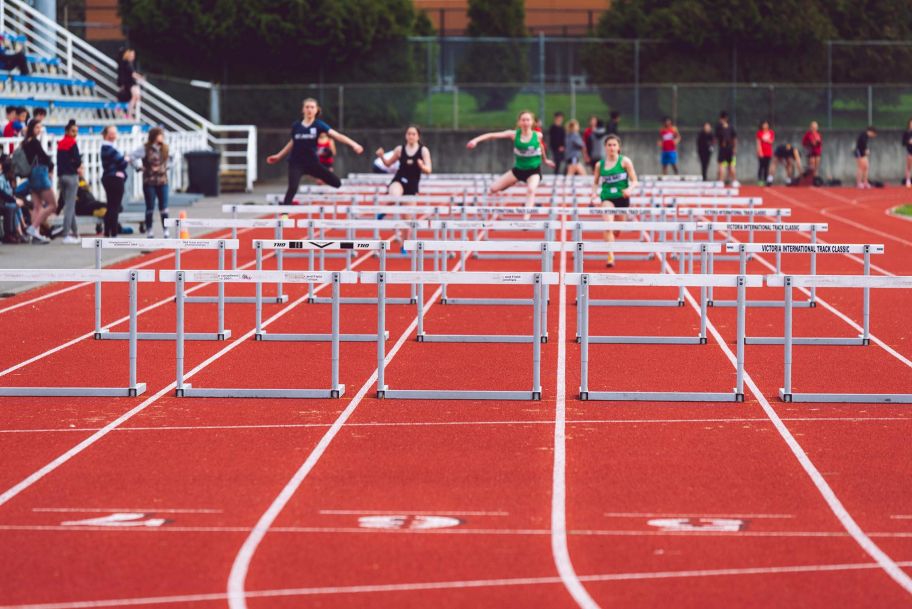Triathlon, like most sports, requires training your mind as well as the body. Many athletes think that plugging away on the trainer or treadmill (thoughtfully known as the dreadmill in my home), prepares your mind for those lonely race day miles. While this is true and absolutely builds a strong mental capacity for the monotony of a race, what about training and tweaking your mindset? Think about it, how many times have you doubted yourself or your abilities during training? Or maybe you don’t push yourself the extra 10% because you think you have already reached your potential? Do you measure your success from overall outcome of the race or workout? Do you beat yourself up over results or engage in the comparison trap with others? All of these things have to do with mindset.
So what exactly is mindset? Beyond the simple Webster’s dictionary definition, mindset.com defines it as: “Mind-sets are those collection of beliefs and thoughts that make up the mental attitude, inclination, habit or disposition that predetermines a person’s interpretations and responses to events, circumstances and situations.” As athletes our mental attitude can make or break our workout or event. Our mindset influences how we see and make sense of the world around us as well as how we see and make sense of ourselves. To get clinical about it, let’s look at what Kendra Cherry; author of Everything Psychology Book (2nd edition); points out about what researchers believe are the 3 components about our attitudes, thus our mindsets. Cherry proposes:
3 components make up an attitude:
1. An Emotional Component: How the object, person, issue or event makes you feel.
2. A Cognitive Component: Your thoughts and beliefs about the subject.
3. A Behavioral Component: How the attitude influences your behavior.
In relation to an athletic event, how you feel about the event influences your attitude toward the event which in turn influences the results! Remember, we are only talking about our mental state, not our physical preparedness or the uncontrollable factors associated with racing/training.
In her book, Mindset: The New Psychology of Success: How We Can Learn to Fulfill Our Potential, Carol S. Dweck, Ph.D. describes two different mindsets: A Fixed-Mindset and a Growth Mindset.
“In a fixed mindset, people believe their basic qualities, like their intelligence or talent, are simply fixed traits. They spend their time documenting their intelligence or talent instead of developing them. They also believe that talent alone creates success—without effort.”
“In a growth mindset, people believe that their most basic abilities can be developed through dedication and hard work—brains and talent are just the starting point. This view creates a love of learning and a resilience that is essential for great accomplishment. Virtually all great people have had these qualities.” Dr Dweck’s research has since become well known globally and is used in the business world, all levels of education, and yes even in athletics.
Reread these definitions. Which one best describes you and your mindset toward triathlon? If you find yourself as someone being stuck in the fixed mindset, you may struggle with enjoying all aspects of the journey that is triathlon. Learning and improving is what creates great athletes, not just pure talent. Talent definitely helps, however, most pros in our sport focus on learning, improving and developing a plan to succeed. Thus, engaging in a growth mindset.
In his book, The Fearless Mind, Dr. Craig Manning talks about the key to high performance are the “factors within our direct responsibility being mastered and controlled.” Manning defines this as “deliberate practice.” When engaged in deliberate practice, we are focusing on our performance and the process, not just the outcome. Manning asserts, when our energy is focused on the things we have direct control over, we build our inner confidence and feel empowered. The correlation with growth mindset and deliberate practice is, by always learning and improving ( through consistency and repetition) in the areas we can control, we are always engaged in deliberate practice.
Having a growth mindset approach to sports, allows us to cope with setbacks in a healthy manner by allowing us to honestly see what went wrong and move forward without beating ourselves up. It keeps us grounded in focusing on the process and our WHY in the first place. Living in a growth mindset grants us the ability to know that we will ALWAYS improve as you work harder at it. Working hard through consistently practicing techniques and skills unique to triathlon, shows character and heart, which is ultimately the definition of a champion.
References:
Manning, C. (2009) The Fearless Mind. Cedar Fort.
Dweck, Carol S. (2006) Mindset The New Psychology of Success. Ballantine Books.
Cherry, Kendra. (2010) Everything Psychology Book (2nd edition). Everything
SEO Content appears the first in source code and on the very bottom of page. Its placement depends on Module.
1. Edit it in CMS "SEO Content" Content Area on normal CMS pages.
2. E-commerce categories have it in "SEO ("SEO Content")" section.
3. E-commerce Product is editable in "SEO Data (Content)" section.
There is default one that is in /styles/master1/c/ folder. If you want to replace it, just upload image with "caption-sub.jpg" name to the folder. Size should be 1920 x 320 pixels (6:1)
You can use Caption Image field in CMS to replace it on specific pages.
Or upload Category Image on category pages.

1. CMS - "Header" field
2. Ecommerce Category - category name
3. Ecommerce Product - product name
4. Blog list - blog name
5. Blog post - post name
6. News/Events item - news/events name
Subtitle
Blog and News/Events module also contain subtitle that is pushed automatically from modules

